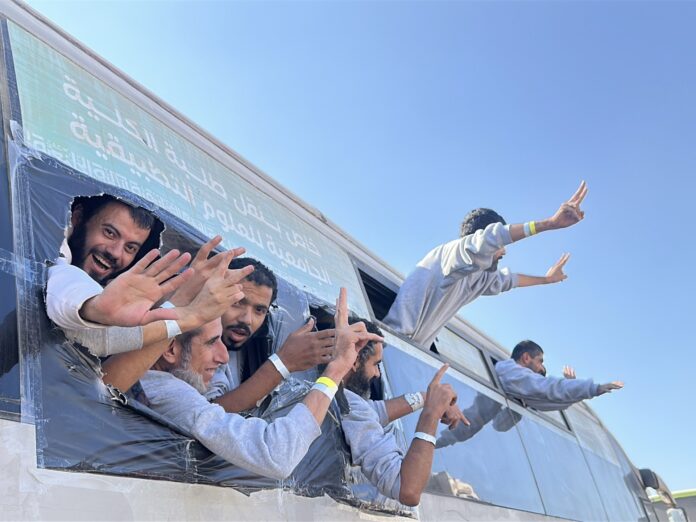Thousands of Palestinians gathered in Ramallah on Monday to await the release of some 2,000 political prisoners and forcibly disappeared people who were taken by Israel from the West Bank, which it occupies, and Gaza, which it has waged war on for two years.
Palestinians welcomed back 96 political prisoners, as well as the vast majority of people Israel detained from Gaza during the war.
Recommended Stories
list of 3 itemsend of list
This comes as part of an exchange of 20 living and 28 deceased Israeli captives held in Gaza for the nearly 2,000 Palestinian captives.
Of the more than 200 Israeli captives taken by Hamas on October 7, 2023, a total of 114 were released during two captive swaps with Hamas in November 2023 and January 2025, respectively.
They were handed over in exchange for the freedom of a total of 1,240 Palestinians.
Despite the brief euphoria, Israel violated ceasefires that coincided with those captive releases, arresting Palestinians across Gaza and the occupied territory wholesale, usually without charge.
Here’s all you need to know about the Palestinians expected to be released as part of the ceasefire deal, as well as those who were not included in the deal and who will stay in captivity.
Who is being released?
A total of 250 Palestinian political prisoners who are either serving life sentences or long sentences are being released from Israeli jails.
According to data obtained by Al Jazeera, all but nine of these prisoners are from the West Bank, and 157 of them are members of Fatah, the party that controls the Palestinian Authority governing parts of the West Bank.
Sixty-five are from Hamas, and the rest are from smaller political factions.
In addition, Israel will free 1,718 Palestinians who were, according to the United Nations, forcefully disappeared by Israel over the last two years of its genocidal war on Gaza.
Five of them are children under the age of 18, and two are women, according to the prisoner list obtained by Al Jazeera.
Most of the disappeared from Gaza were held in military camps, where dehumanisation and torture were rampant, according to international and Israeli and Palestinian human rights groups.
Palestinians were reportedly subjected to severe beatings, medical neglect, starvation and even rape.
According to the Palestinian Prisoner’s Society, 77 prisoners have died in Israeli custody since October 7.
How many Palestinians is Israel not releasing?
Thousands.
According to Addameer, a Palestinian human rights organisation tracking political prisoners, the number of people taken captive by Israel increased from 5,200 to 11,100 since October 7, 2023.
The vast majority of these prisoners are from the occupied West Bank – 400 of them children.
Murad Jadallah, a human rights researcher with Palestinian human rights group Al-Haq, told Al Jazeera: “Israel tries to destroy Palestinian society in different ways, and arresting children is one of the tools it uses to do so.”
Once a Palestinian captive is released, that’s it, right?
No.
Israel tends to re-arrest Palestinians shortly after they are freed in captive swaps, said Tahani Mustafa, an expert on Israel-Palestine with the European Council on Foreign Relations (ECFR).
In November 2023, Israel released 240 Palestinian prisoners in a swap for Israeli captives held by Hamas in Gaza as part of a temporary ceasefire deal.
Weeks later, Israel re-arrested 30 of those people.
“Israel has a long history of using incarceration and arrests as a political weapon, and sometimes that could be for bargaining purposes for a later date,” Mustafa told Al Jazeera.
“There’s also no guarantee [with this current deal] that those being released won’t be rearrested again,” she added.
Will all of these Palestinian detainees be able to go home today?
Most of them have already been released.
While 96 of the 250 high-level political prisoners are being released to the West Bank and Gaza, about 154 of them are being deported from Palestine to third countries that have not been announced yet.
According to WAFA, the 154 have been taken to Egypt, but that will not be the final destination for all of them.
Israel may decide not to release everyone until it also retrieves the bodies of 28 deceased Israeli captives, which are expected over the next 72 hours.
Hamas said that it may struggle to locate all the deceased captives in that timeframe, but that the group is actively searching for them.
Thousands of people gathered in Khan Younis, Gaza, to welcome Palestinians – mostly civilians, including medics – who were disappeared by Israel.
There must be thousands of happy families today?
Well, yes, but they’ve been threatened not to show it.
Families are ordered by Israel not to celebrate the release of their loved ones or raise Palestinian flags in the occupied West Bank and occupied East Jerusalem.
And the families of prisoners who are being exiled today will likely be prevented from travelling abroad to meet them in their country of exile.
Jadallah, from Al-Haq, added that most Palestinians merely hope the captive swap represents a permanent end to Israel’s genocidal war on Gaza.
He added that Palestinians are unhappy that prominent Palestinian leaders such as Marwan Barghouti and Ahmed Saadat will not be released.
The former is arguably the most famous Palestinian political prisoner, traditionally aligned with Fatah, and the latter leads the Popular Front for the Liberation of Palestine.
Renowned Palestinian doctor Hussam Abu Safia, who was abducted from Kamel Adwan Hospital in northern Gaza in December 2024, was not among the list of prisoners expected to be released.
Abu Safia has been subjected to severe torture and solitary confinement, according to human rights monitors.


